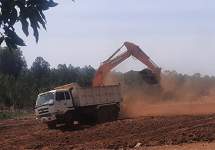A new irrigation dam project under construction near Weybo River in Southern region of Ethiopia is said will enable 12,000 farmers to conduct irrigation farming on 3,429 hectares of land.
Being constructed in Wolaita Zone in two weredas (districts) – Boloso Sore and Boloso Bombe – the project was launched by the government last November, according to the information from the Ministry of Irrigation and Lowlands of Ethiopia.
It is stated that the irrigation dam (water reservoir) can contain up to 60 million cubic meters of water, according to the Ministry. The length od the reservoir is 660 meters with 32.7 meters height, and the water area covers 640 hectares of land.
In addition to agricultural purpose, the Weybo Irrigation project will be serve as a tourist attraction site and for fishery, according to the Ministry said in a statement shared on its social media page.
The construction of the irrigation project is being implemented in two lots involving both private companies and state construction enterprises. The companies taking part in the project are: South Water Works Construction Enterprise, Oromia Construction Corporation, and from private Crossland Construction Private Limited Company.
In Ethiopia over the past few years irrigation farming and water conservation has become major focus of the Government, which recently established a ministry that focuses on the development of lowland areas and irrigation farming.
As a result of the focus on irrigation and development of lowlands, the Government of Ethiopia is now for the first time expects to harvest around 25 million quintals of wheat from irrigation farms during the current irrigation period mainly from smallholder farmers of Ethiopia who covered some 400,000 hectares of land with irrigation farming.
Even though irrigation in river and lake areas has been practiced to grow mainly vegetables and fruits, the use of irrigation to grow major crops mainly wheat is a new practice in Ethiopia. It is introduced and promoted by the reformist Prime Minister Abiy Ahmed, who came to power in April 2018 following popular political unrest in the country.
By expanding irrigation farms, after a few years the Government of Ethiopia envisages to end wheat import, which has been coasting the country hundreds of millions of hard-earned US dollars.
For the past several decades, Ethiopia has been known as a country of tens of millions of smallholder farmers who rely on rainfed agriculture, which makes the country dependent on foreign food aid and import such as wheat.

